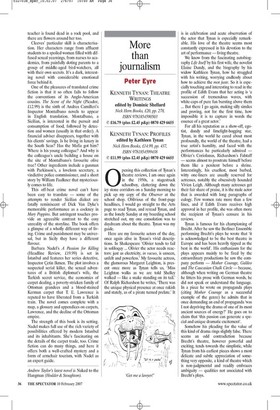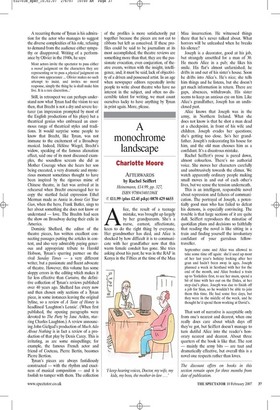More than journalism
Peter Eyre KENNETH TYNAN: THEATRE WRITINGS edited by Dominic Shellard Nick Hem Books, £20, pp. 278, ISBN 9781854590503 £16.79 (plus £2.45 p&p) 0870 429 6655 KENNETH TYNAN: PROFILES edited by Kathleen Tynan Nick Hem Books, £14.99, pp. 437, ISBN 9781854599438 © £11.99 (plus £2.45 p&p) 0870 429 6655 pening this collection of Tynan's theatre reviews, I am once again in the 1950s, a stagestruck schoolboy, clattering down the icy stone corridors on a Sunday morning to pick up my copy of the Observer at the school shop. Oblivious of the front-page headlines, I would go straight to the Arts page to read Tynan, and reread Tynan, and as the lonely Sunday at my boarding school stretched out, my one consolation was to daydream about the theatre. Tynan was my guide.
Here are my favourite actors of the day, once again alive in Tynan's vivid descriptions. In Shakespeare 'Olivier tends to fail in soliloquy ... Olivier the actor needs reactors: just as electricity, in vacuo, is unseen, unfelt and powerless.' My favourite actress, the glamorous Margaret Leighton, is present once more as Tynan tells us, 'Miss Leighton walks as we are told Shelley walked — like a snake standing on its tail.' Of Ralph Richardson he writes, 'There was the unique physical presence at once rakish and stately, as of a pirate turned prelate.' It is in celebration and acute observation of the actor that Tynan is especially remarkable. His love of the theatre seems most constantly expressed in his devotion to the art of performance — living theatre.
We know from the fascinating autobiography Life Itself by his first wife, the novelist Elaine Dundy, and the biography by his widow Kathleen Tynan, how he struggled with his writing, worrying endlessly about how to achieve the mot juste. So it is especially touching and interesting to read in the profile of Edith Evans that her acting is 'a succession of tremendous waves, with white-caps of pure fun bursting above them ... But there I go again, making silly similes and proving, not for the first time, how impossible it is to capture in words the essence of a great actor.'
For all his reputation as a show-off, egotist, dandy and limelight-hogging star, Tynan, in the world he cared about most profoundly, the world of the theatre, had a true artist's humility, and faced with the performances he particularly admired — Olivier's Coriolanus, Richardson's Falstaff — seems almost to prostrate himself before them like a penitent before a shrine. Interestingly, his cruellest, most barbed, witty one-liners are usually reserved for actresses, notably the obsessively hounded Vivien Leigh. Although many actresses get their fair share of praise, it is the male actor that is awarded with long paragraphs of eulogy. Few women rate more than a few lines, and if Edith Evans receives high approval in her profile, she was often more the recipient of Tynan's censure in his reviews.
Tynan is famous for his championing of Brecht. After he saw the Berliner Ensemble performing Brecht's plays he wrote that 'it is acknowledged to be the best theatre in Europe and has been heavily tipped as the best in the world'. His enthusiasm for the plays appears mainly to be fired by the extraordinary productions he saw the company perform — Mother Courage, Galileo and The Caucasian Chalk Circle — because, although when writing on German theatre he litters his prose with German words, he did not speak or understand the language. In a piece he wrote on propaganda plays (citing Mother Courage as a successful example of the genre) he admits that in once demanding an end of propaganda 'was I not depriving the drama of one of its most ancient sources of energy?' He goes on to claim that 'this passion can generate a special and unique dramatic excitement'.
Somehow his pleading for the value of this kind of drama rings slightly false. There seems an odd contradiction because Brecht's theatre, however powerful and exciting, tends towards the simplistic, while Tynan from his earliest pieces shows a most delicate and subtle appreciation of something very opposite, a kind of theatre which is non-judgmental and readily embraces ambiguity — qualities not associated with Brecht's plays.
A recurring theme of Tynan is his admiration for the actor who manages to suggest the diverse complexities of his role, refusing to demand from the audience either sympathy or disapproval. Writing of a performance by Olivier in the 1940s, he says: Most actors invite the spectator to pass either a moral judgment on the characters they are representing or to pass a physical judgment on their own appearance ... Olivier makes no such attempt to insist, and invites no moral response, simply the thing he is shall make him live. It is a rare discretion...'
Still, in retrospect we can perhaps understand now what Tynan had the vision to see then, that Brecht is not a dry and severe lecturer (an impression prompted by most of the English productions of his plays) but a theatrical genius who embraced an enormous range of theatrical styles and traditions. It would surprise some people to know that Brecht, like Tynan, was not immune to the excitement of a Broadway musical. Indeed, Helene Wiegel, Brecht's widow, speaking of the famous alienation effect, said one of its most discussed examples, the soundless scream she did as Mother Courage when she hears her son being executed, a very dramatic and mysterious moment sometimes thought to have been inspired by the rigorous mime of Chinese theatre, in fact was arrived at in rehearsal when Brecht encouraged her to copy the startled facial expression Ethel Merman made as Annie in Annie Get Your Gun, when the hero, Frank Butler, sings to her about something she does not know or understand — love. The Brechts had seen the show on Broadway during their exile in America.
Dominic Shellard, the editor of the theatre pieces, has written excellent connecting passages putting the articles in context, and also very admirably paying generous and appropriate tribute to Harold Hobson, Tynan's sparring partner on the rival Sunday Times — a very different writer, but a passionate and fluent advocate of theatre. However, this volume has some sloppy errors in the editing which makes it far less effective than Curtains, the definitive collection of Tynan's reviews published over 40 years ago. Shellard has every now and then chosen only sections of a Tynan piece, in some instances leaving the original byline, so a review of A Taste of Honey is headlined `Laughton's Lennie'. (When first published, the opening paragraphs were devoted to The Party by Jane Arden, starring Charles Laughton.) A review announcing John Gielgud's production of Much Ado About Nothing is in fact a review of a production of that play by Denis Carey. This is irritating, as are some misspellings; for example, the famous French actor and friend of Cocteau, Pierre Bertin, becomes Pierre Bertion.
Tynan's pieces are always fastidiously constructed — with the rhythm and exactness of musical composition — and it is foolish to tamper with them. The collection of the profiles is more satisfactorily put together because the pieces are not cut to ribbons but left as conceived. If these profiles could be said to be journalism at its most accomplished, the theatre reviews are something more than that; they are the passionate evocation, even conjuration, of theatre events, written with the insight, intelligence, and, it must be said, lack of objectivity of a driven and possessed artist. In an age when newspaper editors repeatedly invite people to write about theatre who have no interest in the subject, and often no discernible talent for writing, we must count ourselves lucky to have anything by Tynan in print again. More, please.














































 Previous page
Previous page